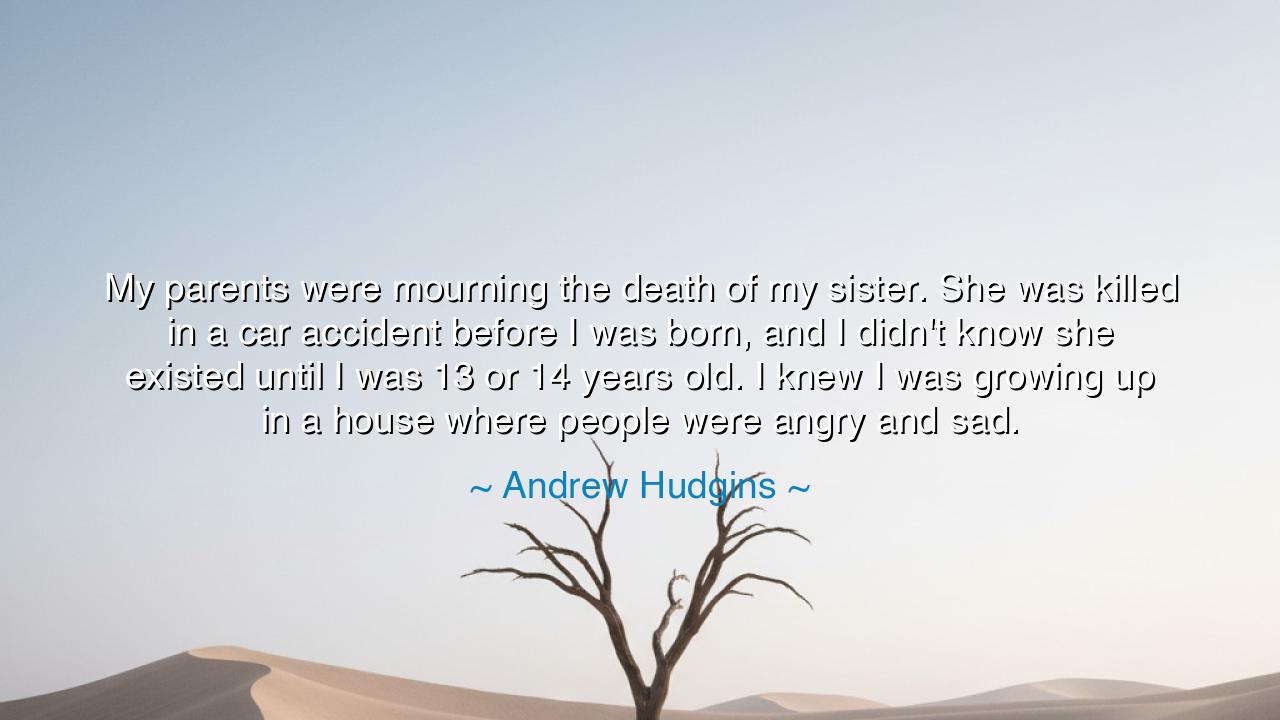
My parents were mourning the death of my sister. She was killed
My parents were mourning the death of my sister. She was killed in a car accident before I was born, and I didn't know she existed until I was 13 or 14 years old. I knew I was growing up in a house where people were angry and sad.






Hear the words of Andrew Hudgins, spoken with the weight of memory and sorrow: “My parents were mourning the death of my sister. She was killed in a car accident before I was born, and I didn’t know she existed until I was 13 or 14 years old. I knew I was growing up in a house where people were angry and sad.” In this testimony, he does not simply recall a family tragedy, but unveils the silent inheritance of grief, the way sorrow lingers like a shadow in the household, shaping the lives of those who come after.
In every age, the ancients taught that grief is not borne by one alone, but seeps into the fabric of kin and clan. When a loved one falls, the cry does not end with the funeral pyre—it echoes through the chambers of the home, leaving its mark upon children not yet born, and even upon generations to come. Hudgins speaks to this truth: he entered the world already dwelling in a house where mourning had taken root, where joy was dimmed, where the air was thick with the unseen presence of the lost. His life was shaped by a sorrow that predated him, proving that grief is an inheritance as real as land or name.
History tells us of similar legacies. After the fall of Troy, Aeneas carried his father upon his back and his people in his heart, fleeing to found a new life. Yet the grief of a ruined city marked his descendants for centuries, fueling Rome’s myths of endurance and struggle. Just as Aeneas bore Anchises, so children often bear the silent weight of their parents’ wounds. Hudgins’s home was not marked by ruins of stone, but by the unseen ruins of spirit—anger and sadness that colored his every step, long before he knew their cause.
There is something deeply human in the way sorrow was hidden from him. His parents, broken by tragedy, did not tell him of the sister who had died until he was nearly grown. Yet even without the words, he knew. Children are not blind to grief; they feel it in the silences, the sharpness of voices, the heaviness of unspoken pain. Hudgins’s discovery at 13 or 14 was not a revelation, but the naming of a ghost he had already lived alongside. Thus we learn: what is hidden still shapes us; what is unsaid still cries out in silence.
And yet, even this truth carries within it a lesson of strength. For if sorrow can be inherited, so too can resilience. Families who have suffered can pass on not only their wounds but also their endurance. The child who grows up in a house of grief may also grow up with sharpened empathy, with deeper understanding of suffering, with a heart more able to comfort others. From sorrow, wisdom may yet arise, and from brokenness, compassion.
The lesson for us, therefore, is to acknowledge the presence of hidden grief. Do not dismiss the moods of a household, nor believe that silence protects the young. Speak openly when you are able, honor the memory of those who are gone, and share the burden, so that it does not fall silently upon children’s shoulders. And if you are the one who inherits such sorrow, know that it does not define you—it can shape you, yes, but it can also strengthen you, if you learn to transform it into understanding and love.
Practically, this means we must tend not only to our own grief, but to how it echoes outward. If you mourn, allow your family to mourn with you; do not build walls of silence. If you sense sorrow in your home, seek its root, and bring it to light, for only in the open can healing begin. Let grief be shared, not hidden; let it be spoken, not buried. For in this way, sorrow becomes not a chain binding generations, but a river that, though deep and dark, carries the family forward toward renewal.
Thus Hudgins’s words, though born of personal tragedy, reveal an eternal teaching: that the grief of one life shapes many, and that to live among the angry and sad is to inherit their burden. But it is also to inherit the chance to rise above it, to turn sorrow into empathy, silence into truth, and despair into resilience. In this way, what begins in mourning may yet end in wisdom, and the story of loss becomes the story of strength.






AAdministratorAdministrator
Welcome, honored guests. Please leave a comment, we will respond soon